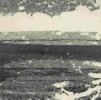Andrew Chalk, "The River that Flows Into the Sands"
 After reviewing Vega, I was sure that Andrew Chalk had some new tricks up his sleeve. Albums like Fall in the Wake of a Flawless Landscape and Over the Edges were dynamic by virtue of their tonal range or through the use of multiple layers shifting throughout the record. Vegasaw Chalk working with the subconscious, slowly pulling it apartthrough slow spatial manipulation. Here, Chalk centers his attention onthe guitar and develops a series of meditations that gives his musicnew depth.
After reviewing Vega, I was sure that Andrew Chalk had some new tricks up his sleeve. Albums like Fall in the Wake of a Flawless Landscape and Over the Edges were dynamic by virtue of their tonal range or through the use of multiple layers shifting throughout the record. Vegasaw Chalk working with the subconscious, slowly pulling it apartthrough slow spatial manipulation. Here, Chalk centers his attention onthe guitar and develops a series of meditations that gives his musicnew depth.
Faraway Press
The first thirty seconds of this record is alarming, mostly because I wasn't sure that it was Andrew Chalk I was listening to. The rest of the album slowly unfolds in ways that I never imagined Chalk would approach. Once I was finished being surprised, the rest of this record slowly mesmerized me. Its serenity is all-encompassing and natural. Instead of providing a steady wave of sounds all interlaced and humming, Chalk has delivered a series of slowly released guitar tones that fade into and out of each other. The silence that is left on the album and the spaces provided between the sounds is what makes all the difference and is cause enough for excitement. Add the inclusion of very distinct melodies and it becomes clear that Chalk is a composer capable of reinventing his music with grace and style.
While all drone music has a drifting quality to it, The River that Flows Into the Sands is worthy of that description for a different reason. The expanses that normally come to mind when I listen to Chalk are gone on this album and replacing those images is a sense of continuous movement. I can only imagine what the sudden arrival of silence and calm must feel like when astronauts puncture the atmosphere and escape Earth's pull, but the weightlessness that everyone has seen in the movies has been translated into sound by Chalk. I think almost anyone can imagine what that feels like. The bowed instruments and contracting moans seem weightless and inconsequential, floating away into nothing, but leaving a path for other sounds to follow. Like a fountain each drone bubbles up and slowly fades away or evolves into a new drone and each time a sound disappears, there is a new voice there to replace it. Multiple listens will reveal, however, that Chalk really hasn't left that much silence on the record. That illusion is generated via the way Chalk mixes very distinct melodic features with fairly constant tones. As they move about together, a sense of space is opened up that may not actually exist. The effects are as real as possible, though, and there is little room for doubt that this one of the most unique albums in Chalk's discography.
Chalk has also broken The River that Flows... into five distinct parts. This would make sense, normally, if all the pieces were of roughly the same length and if each represented some portion of a theme. But, each of the first four pieces hover around the five to seven minute mark and the final track spreads out over eighteen minutes. Not only has Chalk's music developed a new kind of movement that, up until now, was completely foreign to his work, The River that Flows... also marks the only time I have ever seen Chalk structure an album in a way that suggests each piece is a distinct song meant to be considered as an entity unto itself. Though I'd be hard pressed to listen to any of these by themselves, there is a sense that many of these songs are meant to stand on their own two legs. It is easy to think that this is meant to be an album of thematic proportions because much of the record is melancholy. The droning strings are reminiscient of the slowest and saddest of cello sonatas, but aside from that feature the characteristics that each of the songs share is minimal. Each moves in a different way and each elicits emotional responses in different ways.
Chalk's releases this year stand out. Not just because they are amazing albums of a beauty few can produce, but also because each one marks out a very distinct kind of drone record. The River that Flows into the Sands is perhaps the most distinct of the three. It is Chalk's most charming album and it is easily his most addictive. If nothing else, it is a record that might attract fans who wouldn't normally buy a drone album. It is an addictive hobby, so be prepared to spend plenty of time on websites searching for another fix as good as this one.
samples:



